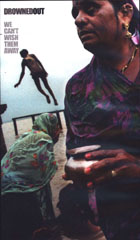
Drowned Out. We Can't Wish Them Away 2002
Distributed by Bullfrog Films, PO Box 149, Oley, PA 19547; 800-543-FROG (3764)
Produced by Spanner Films Ltd.
Directed by Franny Armstrong
VHS, color, 75 min.
Sr. High - Adult
Anthropology, Asian Studies, Environmental Studies, Human Rights
Date Entered: 11/09/2018
Reviewed by Geetha Yapa, Science Library, University of California, RiversideThis award winning film is about decisions made by people with power and how they affect people with no power. It provides an insight as to how political decisions made without the knowledge or the consent of those who will be affected, have far reaching effects on people as well as the environment.
Dams were once considered temples of modern India. The Indian Government has taken steps to build a series of small, medium and large dams across the river Narmada in order to provide electricity, a sustainable water supply for irrigation and drinking water to people in drought stricken areas. The giant Sardar Sarovar dam is the largest of the series of dams being built along the river Narmada. The dam when completed will submerge 245 villages displacing over 250,000 adivasis – indigenous people if India, in addition to drowning a large expanse of fertile land and forests. This film follows the struggles of people affected by the project as they try to halt the construction through a series of non-violent protests, hunger strikes and rallies.
Drowned Out focuses on people living in Jalsindhi (a village along the riverbank) who are facing the threat of disappearing under water as the dam rises. The seasonal monsoon rain on which they relied on for cultivation is fast becoming an additional threat. These proud, self-sufficient people who have lived on the banks of the Narmada for generations are now left with three choices; move to the slums in the city, accept a place at a resettlement site or stay at home and drown. The movie records the plight of one family as they choose to stay and drown rather than relocate. According to the best-selling author Arundathi Roy who joins their fight, “this is the story of modern India”.
The filmmaker has made an attempt to be fair by showing different sides of the story by including comments from engineers working on the project, politicians, villagers who live in drought stricken areas and officials from the World Bank, which funded the project. Two opposing sides of the story emerges as certain groups who have vested interests are eager for the project to proceed while the poor villagers who are about to loose everything they have are against the construction of the dam. However, the unfairness of it all is evident throughout the story revealing lies, promises that are not kept and cannot be kept, overestimation of benefits and the miscalculation of human cost while overlooking the overall impact on the ecosystem.
The film also highlights the strength of the common people who gathered to form the Save the Narmada Campaign (MBA) and the dedication of people like Medha Patkar who were able to force the World Bank to withdraw and to suspend the construction work for years through legal action. Even though they lost the court case in the end and the dam is nearing completion their struggle continues. This is a very thought provoking film that provides interesting topics for discussion as it poses questions such as “development for whom, and at what cost?”
This film is highly recommended for Asian studies collections in high school, college and academic libraries.
Additional information on this topic could be accessed from the following web sites:
Friends of River Narmada
The Greater Common Good. Arundhati Roy
Awards
- Runner-Up, Audience Award for Best Documentary, San Francisco International Film Festival
- Nominated for Best International Documentary, OneWorld Media Awards
- Full Frame Documentary Film Festival
- Silverdocs, American Film Institute
- Robert Flaherty Film Seminar
- United Nations Association Film Festival, Stanford
- Bermuda International Film Festival
- Hot Springs Documentary Film Festival
- Wild Spaces Film Festival
- ImagineAsia Festival, Edinburgh
- Commonwealth Film Festival, Manchester
- Tiburon International Film Festival
- Ashland Independent Film Festival
- 1001 Documentary Festival, Istanbul
- Amnesty International Film Festival, University of Wyoming